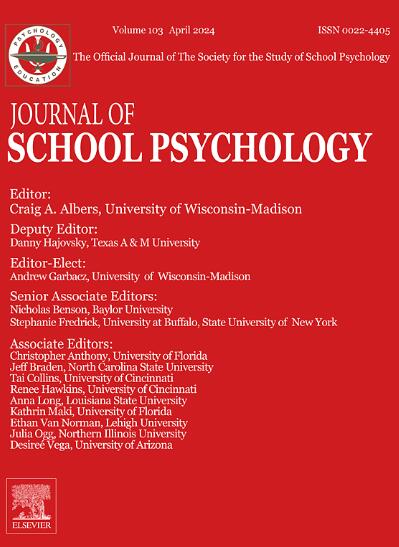Mixed methods systematic review: Using a cultural validity assessment to evaluate prevention programs for Indigenous students
IF 4.1
1区 心理学
Q1 PSYCHOLOGY, SOCIAL
引用次数: 0
Abstract
Implementing culturally appropriate school-based prevention programs with Indigenous students that leverage culture as a protective factor has the potential to revitalize and sustain cultural connections that have historically and systematically been destroyed in the United States. However, there is a dearth of literature synthesizing the effectiveness of school-based prevention programs that have been implemented with Indigenous students across contexts. As such, we conducted a mixed method systematic review to (a) evaluate school-based prevention programs with quantitative and/or qualitative data, (b) assess the use of Indigenous research methods, and (c) examine cultural and community validity. Studies were included if they were published between January 2010 and August 2022, reported quantitative and/or qualitative outcomes for a prevention program implemented in a K–12 school with Indigenous students, or examined an intervention that was designed for Indigenous students (even if there were non-Indigenous students in the study). We strategically included qualitative and mixed methods studies to ensure that cultural and community contexts were represented in this study and to contextualize quantitative findings. Our search resulted in the inclusion of 36 manuscripts describing 28 different interventions. There were 11 mixed methods, three qualitative, and 22 quantitative studies. Quality was assessed using the Mixed Methods Appraisal Tool (Hong et al., 2018) and a randomized controlled trials appraisal tool drawn from the Journal Article Reporting Standards (Appelbaum et al., 2018). Building on the work from Kūkea Shultz and Englert (2021), cultural validity was assessed by conceptualizing cultural validity into the two distinct domains of purposeful engagement and intentional privileging. Intervention effectiveness was evaluated and separated into three criteria (i.e., positive, null, and mixed) to determine if effectiveness varied based on intervention or study design. Most of the studies reported positive outcomes and effectiveness did not vary based on study design (i.e., quantitative, qualitative, and mixed methods) or intervention design (i.e., culturally grounded, culturally adapted or mainstream/no cultural adaptations). We discuss implications of systematic review findings as well as the importance of using mixed methods to understand and contextualize intervention effectiveness when conducting research that relates to identity and culture.
混合方法系统回顾:使用文化效度评估来评估原住民学生的预防计划。
在原住民学生中实施文化上合适的学校预防项目,利用文化作为保护因素,有可能恢复和维持在美国历史上和系统地被破坏的文化联系。然而,缺乏文献综合了在不同背景下对土著学生实施的以学校为基础的预防方案的有效性。因此,我们进行了一项混合方法系统回顾,以(a)用定量和/或定性数据评估基于学校的预防计划,(b)评估土著研究方法的使用情况,以及(c)检查文化和社区有效性。如果研究发表于2010年1月至2022年8月之间,报告了在K-12学校实施的土著学生预防计划的定量和/或定性结果,或检查了为土著学生设计的干预措施(即使研究中有非土著学生),则纳入研究。我们战略性地纳入了定性和混合方法研究,以确保文化和社区背景在本研究中得到体现,并将定量研究结果置于背景中。我们的搜索结果纳入了36篇描述28种不同干预措施的手稿。共有11种混合方法,3种定性研究,22种定量研究。使用混合方法评估工具(Hong et al., 2018)和随机对照试验评估工具(Appelbaum et al., 2018)评估质量。在Kūkea Shultz和Englert(2021)的研究基础上,文化有效性通过将文化有效性概念化为有目的的参与和有意的特权两个不同的领域来评估。评估干预有效性并将其分为三个标准(即积极、无效和混合),以确定有效性是否因干预或研究设计而变化。大多数研究报告的积极结果和有效性没有因研究设计(即定量、定性和混合方法)或干预设计(即文化基础、文化适应或主流/无文化适应)而变化。我们讨论了系统评价结果的含义,以及在进行与身份和文化相关的研究时,使用混合方法来理解和背景化干预效果的重要性。
本文章由计算机程序翻译,如有差异,请以英文原文为准。
求助全文
约1分钟内获得全文
求助全文
来源期刊

Journal of School Psychology
PSYCHOLOGY, EDUCATIONAL-
CiteScore
6.70
自引率
8.00%
发文量
71
期刊介绍:
The Journal of School Psychology publishes original empirical articles and critical reviews of the literature on research and practices relevant to psychological and behavioral processes in school settings. JSP presents research on intervention mechanisms and approaches; schooling effects on the development of social, cognitive, mental-health, and achievement-related outcomes; assessment; and consultation. Submissions from a variety of disciplines are encouraged. All manuscripts are read by the Editor and one or more editorial consultants with the intent of providing appropriate and constructive written reviews.
 求助内容:
求助内容: 应助结果提醒方式:
应助结果提醒方式:


